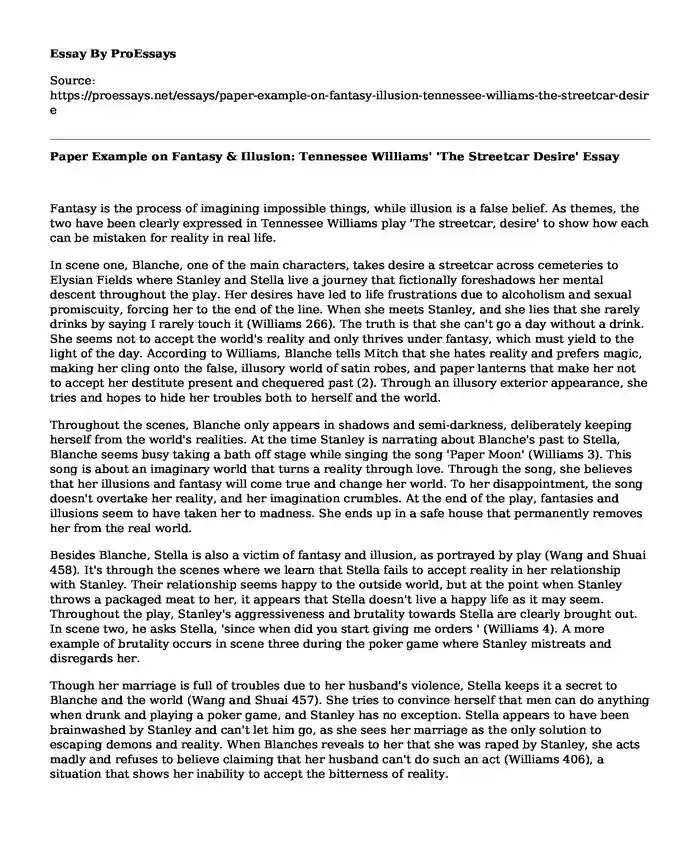Fantasy is the process of imagining impossible things, while illusion is a false belief. As themes, the two have been clearly expressed in Tennessee Williams play 'The streetcar, desire' to show how each can be mistaken for reality in real life.
In scene one, Blanche, one of the main characters, takes desire a streetcar across cemeteries to Elysian Fields where Stanley and Stella live a journey that fictionally foreshadows her mental descent throughout the play. Her desires have led to life frustrations due to alcoholism and sexual promiscuity, forcing her to the end of the line. When she meets Stanley, and she lies that she rarely drinks by saying I rarely touch it (Williams 266). The truth is that she can't go a day without a drink. She seems not to accept the world's reality and only thrives under fantasy, which must yield to the light of the day. According to Williams, Blanche tells Mitch that she hates reality and prefers magic, making her cling onto the false, illusory world of satin robes, and paper lanterns that make her not to accept her destitute present and chequered past (2). Through an illusory exterior appearance, she tries and hopes to hide her troubles both to herself and the world.
Throughout the scenes, Blanche only appears in shadows and semi-darkness, deliberately keeping herself from the world's realities. At the time Stanley is narrating about Blanche's past to Stella, Blanche seems busy taking a bath off stage while singing the song 'Paper Moon' (Williams 3). This song is about an imaginary world that turns a reality through love. Through the song, she believes that her illusions and fantasy will come true and change her world. To her disappointment, the song doesn't overtake her reality, and her imagination crumbles. At the end of the play, fantasies and illusions seem to have taken her to madness. She ends up in a safe house that permanently removes her from the real world.
Besides Blanche, Stella is also a victim of fantasy and illusion, as portrayed by play (Wang and Shuai 458). It's through the scenes where we learn that Stella fails to accept reality in her relationship with Stanley. Their relationship seems happy to the outside world, but at the point when Stanley throws a packaged meat to her, it appears that Stella doesn't live a happy life as it may seem. Throughout the play, Stanley's aggressiveness and brutality towards Stella are clearly brought out. In scene two, he asks Stella, 'since when did you start giving me orders ' (Williams 4). A more example of brutality occurs in scene three during the poker game where Stanley mistreats and disregards her.
Though her marriage is full of troubles due to her husband's violence, Stella keeps it a secret to Blanche and the world (Wang and Shuai 457). She tries to convince herself that men can do anything when drunk and playing a poker game, and Stanley has no exception. Stella appears to have been brainwashed by Stanley and can't let him go, as she sees her marriage as the only solution to escaping demons and reality. When Blanches reveals to her that she was raped by Stanley, she acts madly and refuses to believe claiming that her husband can't do such an act (Williams 406), a situation that shows her inability to accept the bitterness of reality.
Conclusion
Therefore, the whole play is a clear indicator that Stella lives under the influence of fantasy and illusion, which makes her suffer due to Stanley's actions of keeping her under his thumb.
Works Cited
Wang, Xuefei, and Shuai Han. "On the Psychological Realism of A Streetcar Named Desire." 2017 7th International Conference on Education, Management, Computer, and Society (EMCS 2017). Atlantis Press, 2017. file:///E:/25876086.pdf Accessed on 25th June 2020.
Williams, Tennessee. "A Streetcar Named Desire. 1947." New York: New Directions, (2004). http://www.amerlit.com/plays/PLAYS%20Williams,%20Tennesee%20Streetcar%20Named%20Desire%20(1947)%20analysis%20by%207%20critics.pdf Accessed on 25th June 2020.
Williams, Tennessee. A Streetcar Named Desire. Bloomsbury Publishing, 2015. https://www.ibdocuments.com/LitCharts/A-Streetcar-Named-Desire-LitChart.pdf Accessed on 25th June 2020.
Cite this page
Paper Example on Fantasy & Illusion: Tennessee Williams' 'The Streetcar Desire'. (2023, Sep 15). Retrieved from https://proessays.net/essays/paper-example-on-fantasy-illusion-tennessee-williams-the-streetcar-desire
If you are the original author of this essay and no longer wish to have it published on the ProEssays website, please click below to request its removal:
- Essay Sample on Online Influencers in Singapore
- This Is Nigeria by Falz Essay Example
- Research Paper on Fashion Industry Growth: Strategies to Compete in Intense Markets
- Movie Analysis Essay on Sankofa
- Essay Example on Turning the Tables: Preserving History Through NPR Music's Series
- Bach's Musical Journey: Exploring Chromatic Fantasies - Essay Sample
- 1960: The Rejuvenation of Hollywood Film Industry - Essay Sample







